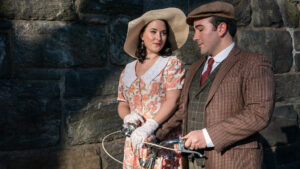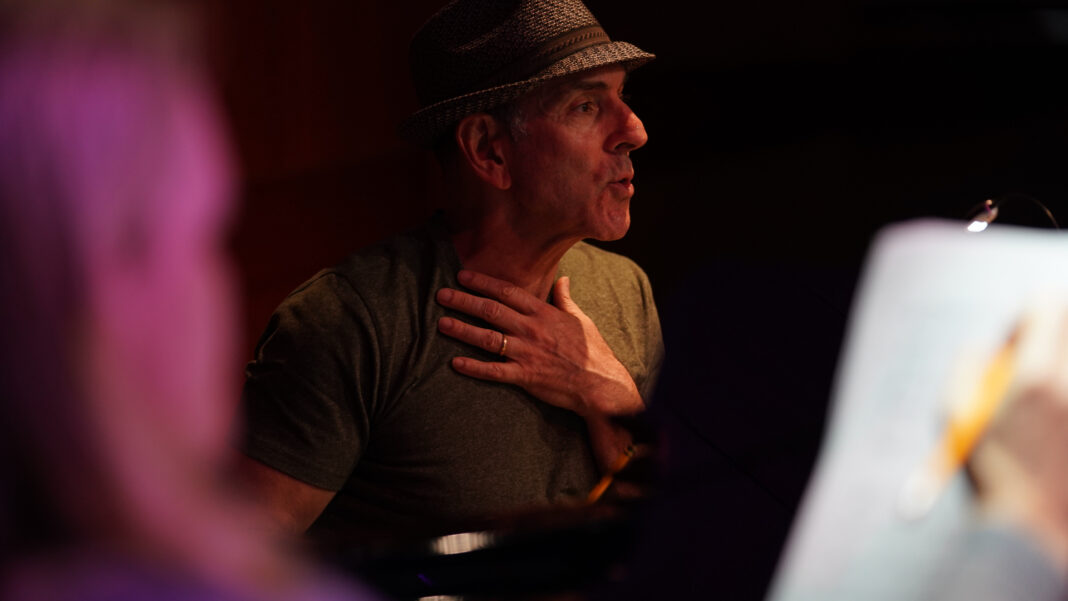The path to writing an opera based on Giorgio Bassani’s novel The Garden of the Finzi-Continis began for composer Ricky Ian Gordon with a train ride from the south shore of Long Island to East Rockaway to see a movie when he was fifteen years old.

“I was obsessed with foreign films. I mean, obsessed. I knew every Bergman film, every Antonioni film, every Alain Resnais film, Truffaut, Kurosawa, Mizoguchi, Yasujiru Ozu. I was crazy. And so I went to see every new foreign film that opened. And, of course, I knew De Sica. I knew The Bicycle Thief. But nothing sort of prepared me for The Garden of the Finzi-Continis. It sort of knocked me out. But I was still a kid, so I was only knocked out as much as you can be at 15.” The film won the 1972 Oscar for Best Foreign Language Film.
It’s a story of two Jewish families in Italy in the 1930s. The Finzi-Continis are enormously wealthy and they feel protected from the outside world in their enormous compound. Giorgio is a member of a less well-off family and is in love with his childhood friend, Micòl, the daughter of the Finzi-Continis. Steadfast loyalty to the Fascist Party and great wealth, however, prove not to be the safety blanket the Finzi-Continis think it will be.
So haunted was Gordon by the film that he would revisit it every five years or so. Fast forward to 2008.
“Michael Korie and I had already written The Grapes of Wrath which was a huge success at Minnesota Opera and we were looking for our next project. I was not thinking about The Garden of Finzi-Continis. I was walking home from the subway. I was on 77th Street and there was one of those video stores and I was going home. I wondered if my partner Kevin had ever seen that movie. So I rented it.
“We watched it that night and I had a reaction to it that I had never had – which was bordering on hysteria. It was so shattering to me. I was a grown up. I had gone through the AIDS crisis. I had gone through the death of a partner. My particular wealth of grief was much deeper. The tragedy in this movie is that at the heart of it is this unrequited love story, which is a very, almost adolescent kind of pain. But that pain is magnified by the pain of the catastrophe in the background. I was really, really moved by it. As soon as I was done heaving and sobbing I came into my office and I called Michael. I said, ‘I think I know what we should do next.’ Michael didn’t even blink. He just said, ‘OK, and we should probably base it on the book.’ So we got the book and that was it. It was our next project.”
The Garden of the Finzi-Continis is being given its world premiere by New York City Opera in conjunction with the National Yiddish Theatre Folksbiene beginning tonight and running through February 6th. It gives Gordon the opportunity to do his Italian opera.
“It’s much more vocal than my other operas in terms of high flying vocal lines that are way more operatic. I have a lot of Verdi and Puccini and Bellini and Rossini swimming around inside me. A lot of times I write in a place bordering that fence between musical theater and opera. I would say The Garden of Finzi-Continis is definitely opera. I think of it as my Italian opera.”
In terms of musical themes, the two families have distinctly different music.

“You feel that right away. The very first moment you meet young Young Micòl there’s almost this cloudy Baroque-y kind of sound. It suddenly becomes contrapuntal and floating in a way that is very unlike what we’ve heard before. Giorgio and the family is more sort of plodding and earthbound. Then all of a sudden Micòl has this sort of floating woodwind and then it starts. They start merging because they [Micòl and Giorgio] start merging.”
In 1984, Bassani told an interviewer that his novel was controversial because, “The real tragedy of the Italian Jews, and no one had ever actually said it, was that they ended up in Buchenwald and in Auschwitz even though they were, for the most part, convinced Fascists.” That very idea inspired Gordon and Korie to write one of the opera’s most moving arias.
“It is embodied in Giorgio”s father who believes Mussolini is for the Jews and that this is going to all work for them. And he argues with his son throughout the opera. Until this very sad, poignant moment, both in the book, in the movie and in the opera, when finally Giorgio comes home after Micòl has spurned him and told him never to come back again. [His father] asks Giorgio how things are going with Micòl and Giorgio burst into tears ‘Leave me to die.’ And the father sings, ‘Let yourself die. At least you’re young enough to be reborn. I’m not.'”
If this seems like the stuff of history books and nostalgia, think again.
“It’s impossible for it not to be seen through a 2022 prism, even if it was a perfect period piece. There is nothing but the rise of anti-Semitism in the world right now. We need only put the story out there because the story itself is about what’s happening right now. NPR did this story two days ago about the rise of incidents of anti-Semitism. This story goes on.” Just three days after our conversation there was the attack on the Congregation Beth Israel synagogue in Colleyville, Texas.
In 2008 Gordon did an interview with Playbill where he was asked to finish the sentence, “I never understood why…” He responded “…There is so much hatred in the world.” He hopes that this opera and his work might play a role in helping us become a more compassionate species.
“I would like my work to be an emollient; something that opens people’s hearts. I would like whatever I pour from my heart into my work to have the effect of thawing the human heart. I feel like there’s a lot of ice, there’s a lot of frozen, there’s a lot of hardness. If art can be a thaw, if it can make people feel more united, if it can make people love one another more… When you create a work of art and all those people are sitting in a theater together, you have, for that moment in time, created community. So I would like that community to grow and I would like to be given a chance to be one of those people that is taking a great part in the healing of the human heart.”
To watch the entire conversation with Ricky Ian Gordon, please go to Cultural Attaché’s YouTube channel here. It’s a provocative conversation with stories involving Lynn Nottage (with whom he’s written the opera Intimate Apparel which is in previews at Lincoln Center), the influence of Stephen Sondheim on his career, politics in the United States and abroad and the opera companies that haven’t embraced his work…yet.
Photo of Ricky Ian Gordon (Photo ©Sarah Shatz/Courtesy New York City Opera)











